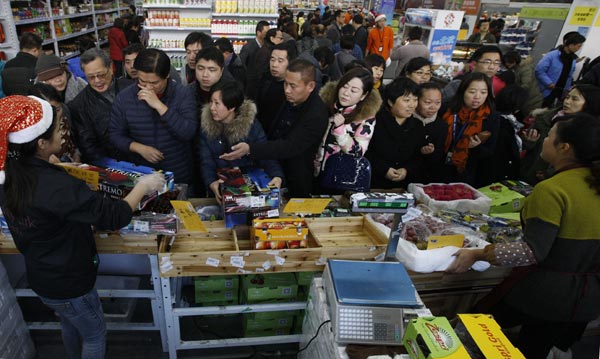|
 |
|
Shoppers buy imported fruit at a shop in the China (Shanghai) Pilot Free Trade Zone. China has signed 12 free trade agreements with countries or regional blocs. [Photo/Xinhua] |
China will look to reach agreements with more nations as it strives to reduce dollar's dominance, officials say
China will step up the pace of its free trade negotiations this year as it seeks to build stronger trade ties with more partners and reduce the dominance of the United States' currency in the global trading system.
Zhang Shaogang, director-general of the department of international trade and economic affairs at the Ministry of Commerce, said China will launch FTA negotiations with Israel and initiate FTA feasibility studies with Colombia, India, Nepal, Maldives and South Pacific island nations like Fiji, Vanuatu and Papua New Guinea this year.
China has signed 12 free trade agreements with countries or regional blocs including Switzerland, New Zealand and the Association of Southeast Asian Nations, and finalized negotiations on FTAs with Australia and South Korea in 2014.
Zhang said the China-South Korea FTA will provide the impetus for further progress on the China-Japan-South Korea FTA and the groundwork for a better regional business partnership this year.
"The rapid development of the US-led Trans-Pacific Partnership has led to a dramatic change in the global market," said Zhang. "China has no choice but to accelerate the pace of inking FTAs with more trading partners."
The Ministry of Commerce has indicated that it would step up negotiations on a free-trade agreement with the Gulf Cooperation Council this year. Zhang said China is also willing to conduct constructive business negotiations with countries along the Silk Road Economic Belt and 21st Century Maritime Silk Road.
Though China's trade growth in 2014 is expected to have been higher than the global average, and that of other key economies, it will continue to face trade risks and uncertainties as downside pressures persist in 2015, said a recent report published by the Beijing-based Chinese Academy of International Trade and Economic Cooperation.
Zhao Zhongxiu, a trade professor at the University of International Business and Economics in Beijing, said the TPP is dominated by the US currency and its financial policies and can to a certain extent consolidate the position of the dollar as a global currency through trade between its members.
"Under such circumstances, the financial resources of the 12 TPP members will be integrated and indirectly controlled by the US. This is something that will hurt China's efforts to boost exports and promote the use of its currency globally," Zhao said.
At the recent Asia Pacific Economic Cooperation meeting in Beijing, leaders of 21 member economies had agreed to start work on a Free Trade Area in the Asia-Pacific region. Work on this is believed to have commenced already and a report with detailed recommendations is expected by the end of 2016,
Gu Xuebin, vice-president of the Chinese Academy of International Trade and Economic Cooperation, said: "The FTAAP, if successfully negotiated, will put an end to the economic fragmentation in the Asia-Pacific region that directly undermines economic integration."
More than 50 bilateral, trilateral and multilateral agreements covering free trade zones had been implemented by economies in the Asia-Pacific region by the end of 2014.
"The co-existence of low-level free trade agreements, however, could fragment the regional economy because of the different purposes and working mechanisms," said Gu.
The FTAAP concept was proposed in 2004 and written into the declaration of the APEC economic leaders' meeting in 2006. China proposed the preparation of a feasibility study in 2014.
Sun Yuanjiang, deputy director-general of the department of international trade and economic affairs at the Ministry of Commerce, said since the FTAAP involves lengthy preparations and negotiations, China will work with all parties concerned to conclude negotiations on the regional comprehensive economic partnership before the end of this year to boost trade volume with the ASEAN markets.
